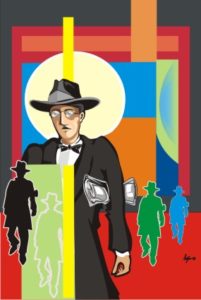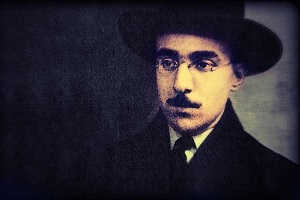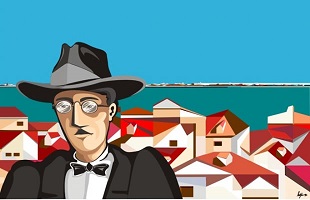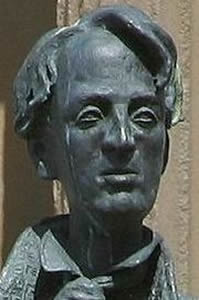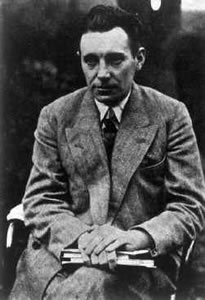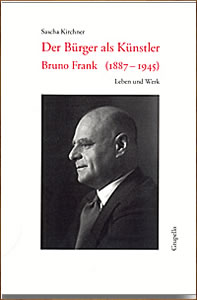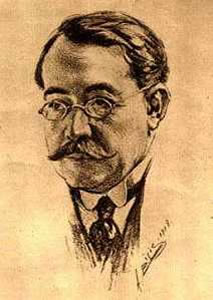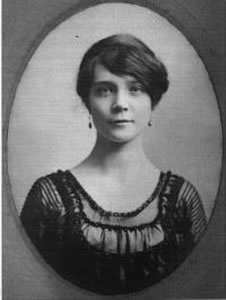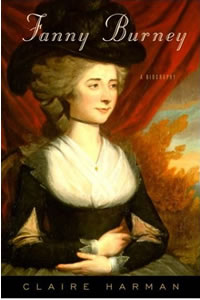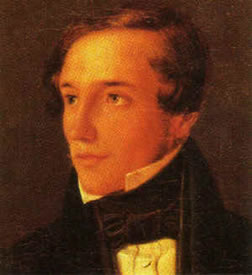De Portugese dichter en schrijver Fernando António Nogueira Pessoa werd geboren in Lissabon op 13 juni 1888. Zie ook alle tags voor Fernando Pessoa op dit blog.
Sonnet V
How can I think, or edge my thoughts to action,
When the miserly press of each day’s need
Aches to a narrowness of spilled distraction
My soul appalled at the world’s work’s time-greed?
How can I pause my thoughts upon the task
My soul was born to think that it must do
When every moment has a thought to ask
To fit the immediate craving of its cue?
The coin I’d heap for marrying my Muse
And build our home i’th’ greater Time-to-be
Becomes dissolved by needs of each day’s use
And I feel beggared of infinity,
Like a true-Christian sinner, each day flesh-driven
By his own act to forfeit his wished heaven.
Sonnet VI
As a bad orator, badly o’er-book-skilled,
Doth overflow his purpose with made heat,
And, like a clock, winds with withoutness willed
What should have been an inner instinct’s feat;
Or as a prose-wit, harshly poet turned,
Lacking the subtler music in his measure,
With useless care labours but to be spurned,
Courting in alien speech the Muse’s pleasure;
I study how to love or how to hate,
Estranged by consciousness from sentiment,
With a thought feeling forced to be sedate
Even when the feeling’s nature is violent;
As who would learn to swim without the river,
When nearest to the trick, as far as ever.
Sonnet VII
Thy words are torture to me, that scarce grieve thee-
That entire death shall null my entire thought;
And I feel torture, not that I believe thee,
But that I cannot disbelieve thee not.
Shall that of me that now contains the stars
Be by the very contained stars survived?
Thus were Fate all unjust. Yet what truth bars
An all unjust Fate’s truth from being believed?
Conjecture cannot fit to the seen world
A garment of its thought untorn or covering,
Or with its stuffed garb forge an otherworld
Without itself its dead deceit discovering;
So, all being possible, an idle thought may
Less idle thoughts, self-known no truer, dismay.
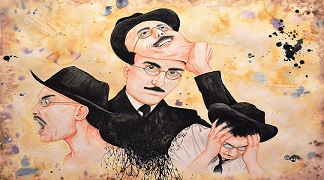
Fernando Pessoa (13 juni 1888 – 30 november 1935)
De Nederlandse schrijver Thomas Heerma van Voss werd geboren in Amsterdam op 13 juni 1990. Zie ook alle tags voor Thomas Heerma van Voss op dit blog.
Uit: Plaatsvervangers
“Rhythm & Poetry.
Onder dat alias verscheen Rob in mijn leven, zo noemde hij zichzelf op MusicMeter – een muzieksite waar duizenden Nederlandse muziekliefhebbers zich dagelijks verzamelen om te discussiëren over artiesten en albums, over opkomende subgenres, over ontwikkelingen in de zogeheten underground, over alles wat er op muziekgebied maar te bespreken valt. Ik deed daar graag aan mee. Hier vond ik mensen die zich met eenzelfde bezetenheid op muziek stortten als ikzelf, die wilden weten wie welk nummer precies had geproduceerd en zich uren konden verliezen in minieme feitjes en geruchten.
Soortgenoten, ja, zo kon je ons wel omschrijven, al beperkten de gesprekken zich tot muziek en kwamen we van elkaar niets te weten behalve ons alias, en in een enkel geval een geboortestad, een leeftijd, een wazige profielfoto. Het profiel van Rhythm & Poetry toonde niets behalve zijn geboortejaar (1989) en de onvoorstelbare hoeveelheid hiphopmuziek die hij beluisterde; minstens drie nieuwe albums per dag, soms wel zes of zeven. Het leek voor hem niet zomaar een tijdverdrijf of hobbyisme, hij luisterde als een onderzoeker. Hij verdiepte zich in oeuvres en substromingen, en wilde elke dag meer ontdekken, net zoals ik.
Daarom vroeg ik hem – evenals talloze andere MusicMeterleden – om voor Hiphopleeft te gaan schrijven. Het was januari 2008. Ik had niets te bieden: geen vergoeding, geen ervaring, geen naamsbekendheid, alleen een onbeholpen site met nauwelijks bezoekers en een paar onopgemerkte artikelen. De meesten reageerden dan ook afwijzend op mijn verzoek. En degenen die wel meededen stopten vrijwel allemaal meteen. Sommigen hadden meer van de site verwacht, anderen vonden mijn redactie te kritisch. Wat de reden ook was, stuk voor stuk verdwenen ze uit mijn leven zonder dat ik ze ooit had ontmoet, vaak zelfs zonder dat ik wist welke naam er schuilging achter hun online – pseudoniem.
Ik was ervan overtuigd dat het bij Rhythm & Poetry hetzelfde zou gaan. Voor ik hem aanschreef had hij nog nooit iets geschreven en direct werd zijn gebrek aan ervaring zichtbaar. Zijn eerste recensie (van een obscure Amerikaanse undergroundrapper) moest in totaal negentien keer heen en weer worden gestuurd voor ze online kon verschijnen. En alsnog stond de bespreking vol slordigheden en stilistische oneffenheden.”

Thomas Heerma van Voss (Amsterdam, 13 juni 1990)
De Nederlandse schrijver Willem Brakman werd geboren op 13 juni 1922 in Den Haag. Zie ook alle tags voor Willem Brakman op dit blog.
Uit: Vestdijk en pantoufles
“Wat de persoon Vestdijk betreft beschik ik alleen maar over wat punctuele herinneringen. Toen ik nog werkzaam was als huisarts en het zo druk had dat ik aan mijn vrouw moest vragen wie ik ook weer was, droeg ik een visionair beeld in mij om van een huisje in Doorn, goed verborgen voor iedereen die wilde storen, waarin een stille werkkamer waarin alleen het krassen van de pen was te horen. “Maar Vestdijk leeft!” dacht ik vaak al trappen beklimmend in een wijk vol flatgebouwen.
Regelmatig kwam hij op bezoek bij Nol Gregoor, die een kleine biografie over hem schreef en ook in Doorn woonde. Daar heb ik hem dan ook een paar maal getroffen en een van die keren werd er op de televisie een documentaire uitgezonden over hem met Gomperts als interviewer. Toen een keer Ans Koster alleen en in close-up op het scherm kwam, riep zij luid en helder: “Een heks!… een heks!… een heks!” Niet boos of geschrokken, maar hard en hoogstens wat krijsend. Het gezicht van Vestdijk bleef onbewolkt, hoe scherp ik ook keek uit de ooghoek. Mogelijk was hij te zeer verdiept in de zeer lovende Gomperts op het scherm of dacht hij terug aan het feest waarop Van Oorschot hem in het oor had gesist na wat glaasjes: “Man… dat verdroogde, uitgeloogde… godv… dat versletene, dat windt me op!” Misschien dempten deze momenten elkaar op dat ogenblik.
Het was in die tijd de gewoonte om op visites en bij de koffie een ‘harde Wener’ te serveren, een uitermate vet en zwaar mokkagebak, dat ik afsloeg met de verduidelijking dat de naam mij te veel deed denken aan een heel erge geslachtsziekte. Toen ik het zei, moest Vestdijk na een tijdje nadenken bleekjes lachen, wat ook wel weer zijn reden zal hebben gehad. Eenmaal had ik op zo’n visite een venijnig twistgesprek met Nol Gregoor, op de rand van een ordinaire ruzie. Ik weet niet meer waarover, maar mijn verborgen bron was de ergernis dat Nol, van nature jaloers als geen ander hier op aarde, Vestdijk te veel afschermde. Ik had zelfs mijn jasje uitgetrokken en maakte in een wit overhemd brede en woedende gebaren. Na afloop krijtwit en uitgeput, hoorde ik Vestdijks commentaar: “Prachtig! Net de Franse Revolutie.”
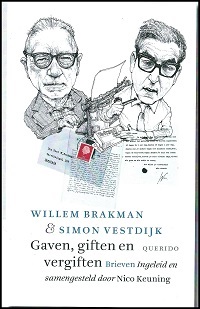
Willem Brakman (13 juni 1922 – 8 mei 2008)
Cover brievenboek
De Franse schrijfster en filmmaakster Virginie Despentes werd geboren in Nancy, Meurthe-et-Moselle, op 13 juni 1969. Zie ook alle tags voor Virginie Despentes op dit blog.
Uit: Bye Bye Blondie (Vertaald door Sian Reynolds)
“The Royal, a bar that’s practically empty during the day. A big room with high ceilings, colored moldings, and pictures by a pal of the owner on the walls. It isn’t really designed for broad daylight, what seems fabulous at night looks a bit tatty by day. Just pushing open the door to the bar is reassuring in itself, in spite of the combined smell of stale tobacco and cleaning products.
“Ooooh, old lady! In one of our moods are we?”
Jérémy, behind the bar, bursts out laughing when he sees her. She would like to stay looking furious, on her high horse, but it doesn’t work. She smiles, and leans on the counter.
“Can you put it on my tab? Till Tuesday?”
“I’d like to say no, but I can see you’d smash the place up. A Jack?”
“Thankyouthankyouthankyou,” she chants, twisting her head on her neck to make the vertebrae click. That very morning, leaning over the washbasin, vomiting up her guts, she had sworn not to have a drink at all today. Her liver’s crying out for understanding, mercy, and respite. But seeing how the day’s turning out, to remain clearheaded wouldn’t be appropriate.
Gloria takes her glass and goes over to a seat. Slight headache, backache, she feels stiff. The warmth of the alcohol immediately unlocks her joints, her knees, the insides of her wrists and elbows. Something relaxes. But it’s still not enough to let her draw breath without pain.
She’s been here before, of course she has, she knows the score by heart. Pain doesn’t lessen with age, on the contrary. But she knows there’s nothing to be done, except wait, day after day, for it to get bearable. Another failure, par for the course, another breakup.
Gloria’s not her real name. Her parents had her christened Stéphanie. But even in primary school she’d changed it, every new year she tried a different one. That wreaked havoc when the teachers realized what she was up to, and it made the other kids suspicious when they figured out she was lying. She’d almost given up when Gloria the “punk princess” became a media icon. She realized it was time to settle on something. It was the early eighties, and she’d just discovered that there was something out there that spoke to her: the Sex Pistols, Bérurier Noir, Sham 69, and Taxi Girl. Hair carefully dyed electric blue, one evening in town she’d met this young guy who’d shown her the three chords for “Gloria” on a guitar.”

Virginie Despentes (Nancy, 13 juni 1969)
De Ierse dichter, toneelschrijver en mysticus William Butler Yeats werd geboren in Sandymount bij Dublin op 13 juni 1865. Zie ook alle tags voor William Butler Yeats op dit blog.
The Spirit Medium
Poetry, music, I have loved, and yet
Because of those new dead
That come into my soul and escape
Confusion of the bed,
Or those begotten or unbegotten
Perning in a band,
I bend my body to the spade
Or grope with a dirty hand.
Or those begotten or unbegotten,
For I would not recall
Some that being unbegotten
Are not individual,
But copy some one action,
Moulding it of dust or sand,
I bend my body to the spade
Or grope with a dirty hand.
An old ghost’s thoughts are lightning,
To follow is to die;
Poetry and music I have banished,
But the stupidity
Of root, shoot, blossom or clay
Makes no demand.
I bend my body to the spade
Or grope with a dirty hand.
To Songs Of A Fool
I
A Speckled cat and a tame hare
Eat at my hearthstone
And sleep there;
And both look up to me alone
For learning and defence
As I look up to providence.
I start out of my sleep to think
Some day I may forget
Their food and drink;
Or, the house door left unshut,
The hare may run till it’s found
The horn’s sweet note and the tooth of the hound.
I bear a burden that might well try
Men that do all by rule,
And what can I
That am a wandering-witted fool
But pray to God that He ease
My great responsibilities?
I slept on my three-legged stool by thc fire.
The speckled cat slept on my knee;
We never thought to enquire
Where the brown hare might be,
And whether the door were shut.
Who knows how she drank the wind
Stretched up on two legs from the mat,
Before she had settled her mind
To drum with her heel and to leap?
Had I but awakened from sleep
And called her name, she had heard.
It may be, and had not stirred,
That now, it may be, has found
The horn’s sweet note and the tooth of the hound.
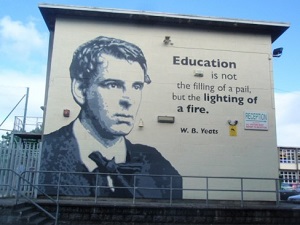
William Butler Yeats (13 juni 1865 – 28 januari 1939)
Muurschildering in Belfast
De Franse journaliste en schrijfster Tristane Banon werd geboren op 13 juni 1979 in Neuilly-sur-Seine. Zie ook alle tags voor Tristane Banon op dit blog.
Uit: Le Bal des hypocrites
« Mardi 10 mai. Il insiste qu’il veut me voir, qu’il doit me voir. Il me dit son nom, son prénom, ses amis, son pedigree. Il m’écrit comme si j’étais de la police. Son courrier m’assure de son honnêteté. Il s’appelle Marin, Marin H, je pense que ça sonne comme Arthur H et ça me fait sourire. Puis je me souviens d’un autre Marin, l’un de ceux qui m’ont trahie par peur de se fâcher avec le sacrosaint pouvoir, grande maîtresse des hommes du milieu, quel que soit le milieu. La puissance du politique. Ma vie est parsemée de Marin, c’est comme un champ de coquelicots, mais certains ne ressemblent plus à rien, fanés, dépéris. À ce souvenir, je ne souris plus. t Il veut me voir car il écrit sur sa femme à lui, lui l’homme du 15 mai. Dans une autre vie, je sais que cette femme a été intelligente. Et puis elle l’a rencontré, il l’a séduite. Elle n’a pas vu, pas voulu voir le babouin derrière l’homme. Son cochon n’est pas babouin à plein temps, juste malade par intermittence. Je me souviens, c’était il y a huit longues années, il était en crise ce jour-là, et il m’a volé mes vingt ans. Je ne les ai jamais retrouvés depuis. C’était il y a huit ans et le cochon m’a volé ma vie. C’était il y a huit ans et, aujourd’hui, Marin H, journaliste, veut encore me parler de « l’Affaire ». Il veut revenir sur « l’Affaire » comme mille autres avant lui depuis des mois, des semaines, des années. Des jours que j’ai enfilés comme des perles sur un collier, la tête basse, les uns après les autres, comme pour me repentir d’un crime qu’un autre aurait commis. Mais il me faut payer, le pays veut ça, la morale veut ça. Ça n’est pas à celui qui a le vice qu’on en veut, c’est à celle qui nous le montre du doigt. Et dire que, sans cette catin, on vivrait tranquilles et heureux dans un univers propre et net. Méchante jeune femme, sale fille qui entache notre belle vision du monde. Étrange monde que celui où, de nouveau, un journaliste veut enquêter pour « savoir » sans jamais « faire savoir ». Il répète « l’Affaire » comme tous ceux qui évitent stratégiquement les mots justes. Pas qu’ils ne veuillent pas choquer, simplement qu’ils veulent rester innocents. C’est moi, la sale fille, celle grâce à qui ils mettront la vérité entre parenthèses, comme pour mieux se protéger. »
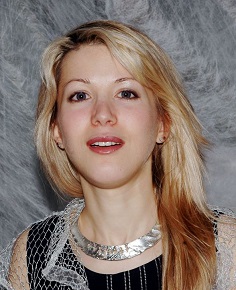
Tristane Banon (Neuilly-sur-Seine,13juni 1979)
De Britse schrijver en presentator Marcel Theroux werd geboren op 13 juni 1968 in Kampala, Oeganda. Zie ook alle tags voor Marcel Theroux op dit blog.
Uit:Strange Bodies
“In the days that followed his showing up at the shop, I tracked down some old friends. A few had lost touch with Nicky altogether, but several had heard that he’d died and one said it was in a road accident. I didn’t ask for the details. Something held me back from telling them about his visit to the shop. Everywhere I checked, the story was the same. University College London was even setting up a memorial fellowship named after him. But Nicky wasn’t dead, and it seemed as though only he and I knew it.
The only way I could make sense of it was to assume that Nicky had got into some kind of trouble and taken a desperate decision to run away from it. It was completely out of character for him, but no other explanation fitted the facts. I knew I hadn’t seen a ghost. He was too material for that.
And besides, I think men, even the good ones, are more apt to cut and run than we are. Ted walked out when Babette was six months old; he said he’d found someone who could make him happier than I could. This woman turned out to be a twenty-four-year-old Italian translator he’d met at a convention in Düsseldorf. That miserable period coincided with the date of Nicky’s death, which might explain why it didn’t make more of an impression on me. All the bad news got rolled up together in one big indigestible lump.
It was almost a year before I saw him again. I was closing up the shop at the end of one of those short December days, rushing because the book group was meeting at my house that evening. Just as I was about to leave, I remembered that it was Kath’s birthday. I unlocked the front door and went back in to get her one of the ceramic Seletti jugs shaped like a milk carton. Sleet was rattling against the shopfront. I grabbed some wrapping paper and a bag to keep it all dry. When I turned round there was a dark shape in the doorway. I froze. The jug slipped out of my hand and smashed on the floor.
“Sukie?” he said.
I felt a little breathless. For an instant, the last twenty-odd years vanished like a trick of the light: no Leonora, no Ted, no kids, no break-ups and false starts, no aging, only the two of us in the half-dark just like the first time I kissed him in Grantchester Meadows.“
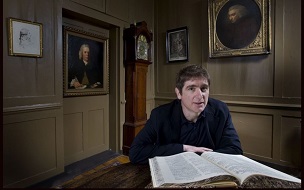
Marcel Theroux (Kampala, 13 juni 1968)
De Vlaamse schrijver Lode Zielens werd geboren in Antwerpen op 13 juni 1901. Zie ook alle tags voor Lode Zielens op dit blog.
Uit: Moeder waarom leven wij
“Nu waren de Paters volop hun metten aan ’t zingen. De stemmen van de novicen klonken jeugdig en vol, de oudsten, die ’t pertang van buiten moesten kennen, hadden moeite om met hun versleten mond die haastigaards bij te houden. Naast een stuk of vier, die nog niet klaar zagen, stond er een kaars op den rand van ’t gestoelte. Als die van den linkerkant het end van hun verske met een schoonen kronkel nog aan het afdraaien waren, sprongen die van den rechterkant al boven op de leste woorden van de anderen, om toch maar geen moment te laten verloren gaan. ’t Was of ze deden om ’t rapste. Kobeke zijn kop werd er aardig van, hij kon met geen mogelijkheid zijn morgengebed lezen. Hij loerde naar Vader Abt of die van tijd geen teeken zou doen aan die jonge mannen vooraan, dat ze niet zoo onpasjentig mochten zijn. Maar Vader Abt gaf katoen juist lijk de anderen. Soms vielen ze allemaal ineens stil, als om asem te halen, en bleven in diepe stilte staan met hun kop over hun psalmboek gebogen. Dan bofte de stilte in de schemerklare kapel neer gelijk een ongeluk, en ge hoorde hier en daar een van de oude Paters een snuifke nemen. Dan hoorde Kobeke ook iederen keer buiten een koppel musschen sjierpen, en ge zaagt beter dat het lichter werd in ’t koor en dat de kaarsevlammekens verflauwden. Koning David stond in het hooge raam met zijn harp en zijn purperen mantel al gereed om de zon te ontvangen. En dan ineens schoten ze weer in gang, rechts tegen links, zoo rap achtereen dat ge der uwen vinger niet kondt tusschen steken. Het was allemaal zoo heilig dat Kobeke gelijk honing over zijn hart voelde drijven. Hij had willen meezingen, met zijn oogen omhoog. Vader Abt zat nu in den glans van koning David zijn purperen mantel.”
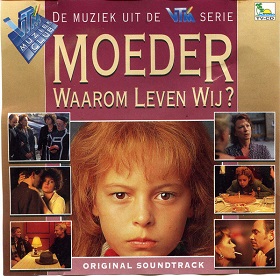
Lode Zielens (13 juni 1901 – 28 november 1944)
Cover CD met de soundtrack uit de gelijknamige tv-serie (1993)
De Engelse schrijfster, dichteres en vertaalster Dorothy Leigh Sayers werd geboren op 13 juni 1893 in Oxford. Zie ook alle tags voor Dorothy L. Sayers op dit blog.
Uit: Five Red Herrings
“If one lives in Galloway, one either fishes or paints. “Either” is perhaps misleading, for most of the painters are fishers also in their spare time. To be neither of these things is considered odd and almost eccentric. Fish is the standard topic of conversation in the pub and the post-office, in the garage and the street, with every sort of person, from the man who arrives for the season with three Hardy rods and a Rolls-Royce, to the man who leads a curious, contemplative life, watching the salmon-nets on the Dee. Weather, which in other parts of the Kingdom is gauged by the standards of the farmer, the gardener, and the weekender, is considered in Galloway in terms of fish and paint. The fisherman-painter has the best of the bargain as far as the weather goes, for the weather that is too bright for the trout deluges his hills and his sea with floods of radiant colour; the rain that interrupts picture-making puts water into the rivers and the locks and sends him hopefully forth with rod and creel; while on cold dull days, when there is neither purple on the hills nor fly on the river, he can join a friendly party in a cosy bar and exchange information about Cardinals and March Browns, and practise making intricate knots in gut.
The artistic centre of Galloway is Kirkcudbright, where the painters form a scattered constellation, whose nucleus is in the High Street, and whose outer stars twinkle in remote hillside cottages, radiating brightness as far as Gatehouse-of-Fleet. There are large and stately studios, panelled and high, in strong stone houses filled with gleaming brass and polished oak. There are workaday studios—summer perching-places rather than settled homes–where a good north light and a litter of brushes and canvas form the whole of the artistic stock-in-trade. There are little homely studios, gay with blue and red and yellow curtains and odd scraps of pottery, tucked away down narrow closes and adorned with gardens, where old-fashioned flowers riot in the rich and friendly soil. There are studios that are simply and solely barns, made beautiful by ample proportions and high-pitched rafters, and habitable by the addition of a tortoise stove and a gas-ring. There are artists who have large families and keep domestics in cap and apron; artists who engage rooms, and are taken care of by landladies; artists who live in couples or alone, with a woman who comes in to clean; artists who live hermit-like and do their own charing. There are painters in oils, painters in water-colour, painters in pastel, etchers and illustrators, workers in metal; artists of every variety, having this one thing in common–that they take their work seriously and have no time for amateurs.”
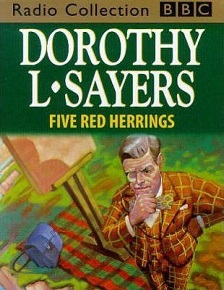
Dorothy L. Sayers (13 juni 1893 – 17 december 1957)
Cover audiobook
Zie voor nog meer schrijvers van de 13e juni ook mijn blog van 13 juni 2017 en mijn blog van 13 juni 2015 deel 1 en eveneens deel 2.

